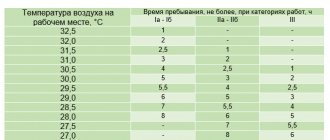Minimum wage and sick leave
As for sick leave, a new rule has appeared in 2021 - for a full month, sick leave cannot be less than the minimum wage. This improved the situation of those workers who, for example, had a short insurance period (less than 8 years). Of course, you also need to take into account the rate.
Example:
An employee works at a rate of 0.5. Takes sick leave in 2021 in January from the 11th to the 15th, billing period from January 1, 2021 to December 31, 2021. During this time, his earnings amounted to 300,000 rubles. The employee works in an area where the regional coefficient of 15% applies.
We calculate the average earnings:
300 000 / 730 = 410,96.
The minimum wage in 2021 is 12792. We calculate the average daily earnings from the minimum wage:
12792 / 31 = 412,65
It is already obvious that the minimum wage calculation is higher than the average of actual earnings. So we will calculate the benefit from the minimum wage:
412.65 * 0.5 (bet) = 206.33; 206.33 * 5 (sick leave days) = 1031.65; 1031.65 * 1.15 (regional coefficient) = 1186.40
Rice. 1 Example of Calculation from the BukhSoft program
You can right now order free access to the BukhSoft accounting program and index your salary taking into account changes.
Order access to BukhSoft
The minimum wage can also be set in each region. It is determined by the constituent entities of the Russian Federation by regional agreements on the minimum wage. As a rule, the regional minimum wage is equal to or greater than the federal minimum wage. If the region uses regional coefficients, then it must be taken into account that they are not included in the minimum wage and must be calculated in excess of its size.
For example: an employee works in an area equated to the regions of the Far North in a region where a regional coefficient of 15% applies, which means his minimum salary per month must be at least 12792 15% = 14710.80.
Please note that if your sick leave, for example, began in December 2021 and continued in January 2021, then to compare benefits in each individual month you will have to use a different minimum wage - in December it was 12,130, and in January it was already 12,792 rubles.
Note that if an employee was sick, then his earnings in a month not fully worked may be less than the minimum wage. Let's take the data from the previous example about sick leave. The employee was sick from January 11 to January 15, 2021 (5 calendar days, all of them were working days). According to the production calendar, he has 15 working days in January. Let his salary be 18,000 rubles. When calculating salaries for January, the accountant calculated the salary:
18000 / 15 * 5 = 12000 - this is how much employees’ salaries were accrued.
At the same time, there is no violation, because he worked for less than a month.
Similarly, you need to consider the months in which the employee took leave, paid or without pay, absenteeism, etc.
Order access to the BukhSoft accounting program for 2 weeks. All accounting in one program - assistance on accounting, legal and personnel issues.
Order access
And yet, can a salary or salary be less than the minimum wage?
Let's consider the options when an employee can quite legally receive less than the minimum wage or his salary is less (which is not the same thing):
- The salary may be less than the regional figure if the organization has not joined the regional agreement in accordance with Art. 133.1 of the Labor Code of the Russian Federation (i.e., within 30 days after publication of the proposal, it sent objections).
- An employee’s salary (fixed payment per month) can be less than the minimum wage only in 1 case: if the employee receives incentive payments, compensation and allowances in addition to it (confirmed by the decision of the RF Armed Forces dated August 30, 2013 No. 93-KGPR13-2). However, regional coefficients should not be included in these categories. They apply to wages, which must no longer be less than the minimum wage.
- The employee did not comply with working time standards or labor standards (the condition for compliance is stipulated in Article 133 of the Labor Code of the Russian Federation). This case should not be confused with situations where reduced working hours are established by law (for example, for people with disabilities - Article 92 of the Labor Code of the Russian Federation).
- An employee can receive a salary that is less than the minimum for the reason that 13% personal income tax is withheld from it. The eligibility requirement applies to the original earnings.
***
Thus, the employee's salary may be less than the minimum wage.
But you need to remember that the minimum wage is changing upward, and there are also nuances in calculating wages, and avoid violating legal requirements, given the high level of responsibility applied to the employer in this case. You can find more complete information on the topic in ConsultantPlus. Free trial access to the system for 2 days.
The Federal Tax Service controls the amount of wages
The minimum wage is established, on the one hand, to guarantee workers protection from unreasonable understatement of wages, and on the other hand, to avoid concealment of taxable income and non-payment of personal income tax.
In order to control the amount of remuneration of workers, the Federal Tax Service of Russia has developed control ratios for the calculation in form 6-NDFL (letter of the Federal Tax Service of Russia dated October 17, 2021 No. BS-4-11 / [email protected] ) and the calculation of insurance premiums ( letter of the Federal Tax Service of Russia dated 02/07/2020 No. BS-4-11/ [email protected] ).
Control ratios compare the average wage in the calculation provided by the employer with the minimum wage, as well as with the average wage in the region for the relevant industry (according to Rosstat).
If the employer indicates a low salary for employees in the 6-NDFL calculation or in the calculation of insurance contributions, the tax authority sends a request for explanations (clause 3 of Article 88 of the Tax Code of the Russian Federation).
The explanations and documents provided by the employer are reviewed by the tax authority. If explanations are not provided, or if, after considering them, the tax authority has reason to assume that the tax base is understated, other tax control measures are determined, including a call to the interdepartmental commission for the legalization of the tax base and the base for insurance premiums in accordance with the letter of the Federal Tax Service of Russia dated dated July 25, 2017 No. ED-4-15/ [email protected]
As part of information interaction, information about employers paying low wages to employees is sent by tax authorities to the labor inspectorate and prosecutorial authorities to take measures in accordance with the powers granted.
Thus, the employer can be checked not only at the request of the offended employee, but also after submitting HR reports . A legislative increase in the minimum wage should be a signal to every employer to check personnel documents and employment contracts for compliance with the current level of the minimum wage. making changes to employee documentation, which should undoubtedly affect the actual increase in cash payments to employees.
What should an employee do and where should he go?

If an employee is paid less than the minimum wage, he can complain to the regulatory authorities:
- An active trade union - it is authorized to resolve labor disputes between its members and the business entity. If necessary, he will provide assistance in preparing a complaint to the labor inspectorate, prosecutor's office, and other regulatory authorities.
- Labor Inspectorate - oversees compliance with labor laws. Accepts a written statement of violation, on the basis of which an inspection can be initiated. Does not resolve issues related to money - if an employee wants to receive compensation for the time when he had a salary less than the minimum wage, he must go to court.
- The prosecutor's office is a supervisory body that can receive statements of violations from employees and conduct inspections. Based on their results, the prosecutor's office is authorized to open administrative or criminal court cases.
- Court - to go to court, it is necessary to prepare an evidence base, as well as hire a lawyer who will represent the interests of the employee. Based on the results of the proceedings, the employee may be awarded compensation for the entire period, for delayed wages, coverage for moral damage caused, compensation for attorney fees, etc.
The Criminal Code provides for the following types of punishment:
- Monetary fine: 100,000 - 500,000 rubles in ordinary cases, 200,000 -500,000 in case of serious consequences;
- A fine in the amount of the convicted person’s income for a period of up to 3 years in ordinary cases, or from 1 to 3 years in cases involving grave consequences;
- Forced labor for up to three years (can be applied with or without deprivation of the right to hold certain positions);
- Restriction of freedom for a period of up to 3 years or for a period of 2 to 5 years (with grave consequences), can also be applied in conjunction with deprivation of the right to work in certain positions.
The guilty person can avoid criminal liability if, within two months from the date of initiation of the criminal case, he pays wages in the required amount and compensates employees for penalties, moral compensation and other payments provided for by law (provided that this offense was committed by him for the first time).
Paying wages less than the minimum wage entails administrative or criminal liability. It is important to understand that both types of liability can apply simultaneously.
Additional payment up to the minimum wage
The management of some entities sometimes asks whether it is possible to pay wages to their employees less than the established minimum wage for two months, and then in the third month, with the help of certain payments, to bring its amount up to the amount established by law.
That is, make a compensatory payment for the quarter, which will be equal to the amount of the difference between the minimum wage and the employee’s real salary for the entire period under consideration.
However, the opinion of the Ministry of Labor in resolving this issue is established in a letter, which states that the compliance of remuneration for work with the minimum wage should be carried out monthly, and additional payments made in the third month are taken into account only when compared with the minimum wage for this month.
Attention! Thus, bonuses to employees up to the minimum wage should be made monthly, if necessary.
Work for a small salary or not work at all?
Guests
Ksenia Yurkova labor market expert
Konstantin Korishchenko Doctor of Economics, Professor of RANEPA
Oksana Galkevich:
So, let's now try to solve the socio-economic problem together. So, given: a small town, the population has been falling in recent years, there is no industry or production, unemployment is almost 9%.
Konstantin Churikov:
Also, some residents leave to work on a rotational basis, while others travel several tens of kilometers to a larger neighboring city. Well, some, in general, do this beyond the Urals, others – before the Urals. In general, this picture is observed throughout the country.
Oksana Galkevich:
Yes. And suddenly, in this bleak information field, an investor appears and says: “I’ll build an enterprise here. Just come to work." And even subsequently he keeps his promise and opens a brand new factory. So, Kostya, what do you think, will he find employees?
Konstantin Churikov:
What is the salary and schedule?
Oksana Galkevich:
Well, Kostya, just imagine that you are unemployed first of all. Well, why are you showing off, let’s put it this way? Agree to any conditions - they give you a job.
Konstantin Churikov:
No, wait... I don't want that. And I think I’m not the only one who doesn’t want it that way.
Oksana Galkevich:
Do you see?
Konstantin Churikov:
“Announce the entire list, please.”
Oksana Galkevich:
This is Kostya.
And you place your bets, friends. What do you think about this? Will a private investor be able to launch production in such a small town? Toll-free numbers for your opinions are indicated on our screens.
We will now show you a story from a real city in Bashkiria, and then we will return to discussing this story in the studio.
PLOT
Konstantin Churikov:
We have so many messages already on the portal! “Have you tried paying for the work?” - Moscow. “Unlucky with the people again?” - Voronezh. “What kind of Russians don’t want to work?” Let's go, Oksana!
Oksana Galkevich:
Yes, there is a lot here... Did you tell me “here we go”? I’ll rush now, Kostya.
In general, the opinion is this, friends: “If it’s the minimum wage, then it won’t work.” Many people write exactly this way now. Look at these numbers. In Bashkiria, by the way, the minimum wage is now almost 14 thousand, but the average there is almost 27. But just go ahead and earn this average, as they say. Maybe over 27 they would go to work at this factory.
Konstantin Churikov:
But, by the way, you still need to subtract taxes from the minimum wage - and you’ll end up with tears in your hands. At the same time, in our country, 20 million people officially live on these incomes, even below the minimum wage. In fact, these people are below the poverty line - that is, in general, in poverty, if we speak in Russian.
Oksana Galkevich:
Well, I must honestly say, friends, that if people receive the minimum wage, then they have not moved far from this poverty line. Right? We are aware of this.
Please join our conversation, dear viewers. Phones on screens. Call and write, speak out. We see your reaction. We want to hear you, not just read you.
Well, Ksenia Yurkova, a labor market expert, is in touch with us now. Ksenia Alexandrovna, hello.
Ksenia Yurkova:
Good afternoon.
Konstantin Churikov:
Hello. Ksenia Aleksandrovna, do you often see resumes of applicants in some database of yours, among your colleagues, where people write that they are ready to work for the minimum wage? Does this happen often? And in what areas, perhaps, in what age groups?
Ksenia Yurkova:
You know, in fact, this is exactly my topic. I work with regions, with positions that do not require special training, with line personnel. And I see this situation almost every day. In fact, I’ll say right away that I fully support the mayor of this city, because, I repeat, I hear and see every day how people say: “I didn’t find myself in a trash heap. Pay me 50/60/70 thousand rubles.” But at the same time, the person, in essence, is not worth the money.
And now we are talking about a small town. Who is the question for? Question for the mayor of the city: what is the situation like this in the country? It cannot be that in neighboring villages and towns people earn 30/40/50, but in this city they earn a different amount. Therefore, this situation is in the country as a whole.
Oksana Galkevich:
You know, it’s interesting with this city. Today I tried to collect information about this city. There really are no production facilities there, there is no industry of any kind. It was created, as stated in the story, when they were going to build the Bashkir nuclear power plant there. Then this story was scrapped; the station was not built there. Accordingly, the city was left without any serious enterprises where there could be jobs.
Nevertheless, let's look at this graphic. Information on Bashkiria. This is data for the last year. There are now 117 thousand people registered at the labor exchange. There are only 40 thousand vacancies. This imbalance... That is, it turns out that there are fewer vacancies than people looking for work. They need to be employed somehow, they need to be employed somehow... There must be, as they say, demand higher than supply.
Ksenia Yurkova:
We are now talking about a situation where people prefer to sit and receive unemployment benefits or simply sit at home and not work. We are now talking about these categories of citizens.
Oksana Galkevich:
Ksenia Alexandrovna, can you really stay at home on our allowance?
Ksenia Yurkova:
Well look. Firstly, people actually rely on this benefit. This time. Secondly, people, in principle, without going to the labor exchange, say: “Guys, I won’t go to work for 12 thousand. I will starve, I will sit on my parents’ neck, I will sit on my husband/wife’s neck, but I will not go to work for 12 thousand rubles.” This is indeed the position of many people, job seekers in the market.
Konstantin Churikov:
Ksenia Alexandrovna, let’s ask the audience now. We are launching SMS voting - 5445. The question is simple: “Would you go to work for the minimum wage?” - that is, the minimum wage. “Yes” or “no” – 5445.
We have a call, Arkady from the Tomsk region. Arkady, hello.
Viewer:
Hello.
Konstantin Churikov:
Would you go to work for the minimum wage, Arkady?
Viewer:
In no case.
Konstantin Churikov:
Arguments. Why not?
Viewer:
I wouldn't go under any circumstances.
Oksana Galkevich:
Why? Well, if suddenly... Look, it’s a real-life situation: a person is left without a job and can’t find one for a long time. They showed in Bashkiria that during the year 117 thousand people look for this job and remain on this labor exchange. You've been looking for a long time. You are offered a job - stable, but the salary is low. How long can you wait and search? Maybe we should still agree and continue looking for something? As they say, why not?
Viewer:
I just live in a rural area. In rural areas it is very difficult to remain without work. You can run your own farm in any way and earn much more than the minimum wage.
Oksana Galkevich:
It's clear.
Konstantin Churikov:
Perhaps you had another question for Ksenia Alexandrovna? No?
Viewer:
No, there is no question. Russians can work and want to work, but, of course, they won’t work for pennies. I can just give an example from my area. When an enterprise opens and people have the opportunity to earn 20 thousand or more, people go and work.
Ksenia Yurkova:
Arkady, can I ask a question?
Viewer:
Yes.
Ksenia Yurkova:
You just talked about the countryside, about how you can make money on your farm. Let’s assume you don’t have your own farm. Would you still go to work at the minimum wage or would you stay at home?
Viewer:
I would go and get a job on a shift - which is what I do.
Oksana Galkevich:
Oh, just like that.
Konstantin Churikov:
Thanks for your call.
Oksana Galkevich:
That is, it’s still not a matter of your own subsidiary plot.
Konstantin Churikov:
Ksenia Alexandrovna, in the story that we saw, there was also a woman who said: “Well, at the very least you can always find a job,” and said: “I’ve been working for 30 years, I get 15 thousand.”
Please tell me, from the point of view of further career growth in general, for example, a person... Everyone still wants to achieve something in life. If, for example, a specialist comes to a serious employer and says: “I’ve been working for 30 years.” They ask: “How much did you receive?” Answer: “15 thousand.” Tell me, will this person easily find a job in a serious company or not?
Ksenia Yurkova:
Well, it depends where he will find a job. Of course, you need to understand... Everything here depends not on the salary, but on the position, on his knowledge and skills. I’ll tell you that I came to Moscow from exactly the same city many years ago, where the salaries are absolutely the same. And now, when the pandemic began, you know, I’m driving home and thinking: “What should I do? Would I go to work? Well, I won't have a job now. Will I go to work as a cleaner? And for myself personally, I honestly answered the question: “Yes, I will go,” because I need to feed the child, because I have my own obligations. Yes I am going.
I repeat once again: those who want to earn money really go on shifts. Well, how much can you earn in Moscow? From 35 to 50 thousand. Someone is ready to pick up and move - not permanently, but perhaps temporarily, on a shift basis. There is, again, remote work, which we are talking about. Quarantine and the pandemic have opened up opportunities for us to work remotely. Also an option.
You can go to further study. It is clear that not everyone has time. It is clear that it is easy for me to say. Many people live: home - work - home - work. And what kind of training? This is money, this is time, there is no opportunity. Again, we are talking about the fact that you can either go to Moscow for a shift, or try to find a job remotely.
Oksana Galkevich:
Ksenia Aleksandrovna, maybe it’s because... You say that you would agree to work in case of some emergency, even for a small salary, because you don’t have some kind of, so to speak, “safety cushion” , additional income. Well, I don’t know, someone is renting out an apartment. For some, I don’t know, the pension of older relatives helps, helps out. But there must still be a reason why a person, if he does not lead some kind of asocial lifestyle, does not meet some circumstances halfway, realizing: “Well, now there is no dream job, but you have to work.” There must be some reasons explaining this.
Ksenia Yurkova:
You know, firstly, I think that this is a culture that is now being formed, especially among young people. They really rightly say that now going to work as a cleaner, going to work in sales – well, this is not Instagram. That is, it’s prestigious there, it’s profitable to work there, to run some kind of blog.
The first is, as I said, culture. Secondly, society probably forms the following opinion: “You are a human being. You deserve better. You must demand a salary from your employer. You must demand from the employer some kind of schedule, some certain conditions.” And the fact that you are obliged is very little said about this, including on television.
Oksana Galkevich:
Wait. That is, it turns out that working, I don’t know, is temporary... No one says that the direct task is to remain in this position all your life. Working as a janitor, cleaner or cashier in some store is a story of failure, an unsuccessful story, a shameful story, right? Is that why it is perceived this way and people often disagree? After all, no one says that you will work in this position all your life.
Konstantin Churikov:
May I intervene? If you join a large and serious company and have a stressful interview with some HR specialist, then that’s all, it will be dealt with immediately.
Oksana Galkevich:
Kostya, what HR? Where are these HR people, these Janissaries - where do they sit?
Konstantin Churikov:
Well, not in Agidel.
Oksana Galkevich:
Where are they sitting? They are sitting in Moscow.
Konstantin Churikov:
Yes.
Oksana Galkevich:
You and I from Bashkiria are now analyzing a story that concerns 90% of the country. 10% is Moscow.
Konstantin Churikov:
I do not argue.
Oksana Galkevich:
Eichars-Janissaries.
Ksenia Yurkova:
I'll tell you that just last week I hired an employee who, in principle, did not meet my requirements, just for one phrase. She said: “You know, I have had different periods of my life. It was necessary - and I sold watermelons at the market.” And that’s the only reason I took it. Because I understand that there will be some kind of situation in the company, in the department - she will not sit and whine, she will take it and find a way out of the situation.
Oksana Galkevich:
Here!
Ksenia Yurkova:
I think that many...
Konstantin Churikov:
Ksenia Alexandrovna, what position did they take this girl to?
Ksenia Yurkova:
Selection manager.
Konstantin Churikov:
Staff?
Ksenia Yurkova:
Yes Yes Yes. To the HR department.
Konstantin Churikov:
It's clear. So, let's listen to the call again. Hello Andrey from Kaluga.
Oksana Galkevich:
Hello Andrei.
Viewer:
Hello Hello. That's exactly what I'm talking about. It's good that I called. I work as a janitor. They say it's not a prestigious job. That's right, it is not prestigious, and it is also very heavy, especially in winter and when the leaves fall, it requires order. They pay me a pittance salary, they haven’t raised it for five years. Above me is the director, deputy. director. Above the director there is still a director. And the guys feel good, polished, rosy-cheeked, driving foreign cars. And they travel and relax more than once a year.
My sister was offered a job as a cleaner at a cleaning company. By the way, your expert says: “I would become a cleaner if life forced me.” 7.5 thousand, two floors to clean. Can you imagine cleaning two floors of a school? Well, not a school, but a dormitory. And 7.5 thousand. Because the cleaning company also has a director...
Maybe just a lot of drones? Maybe wages are being distributed inappropriately? Maybe someone should cut down on their appetites? Namely, those who work, who clean up, wash the floors, they exist. But these comrades who at one time settled down at the feeding trough are not bad.
And I also have a friend who works at the post office as a postman for minimum wage. I recently found out that the manager, well, the general director of Russian Post, built himself a new cottage for a billion. His deputy is about 300 million...
Oksana Galkevich:
Andrey, this is an old story, it’s already several years old. They have already replaced this general director.
Konstantin Churikov:
It's already sorted out there.
Oksana Galkevich:
Yes.
Viewer:
The question is that all this is distributed unfairly.
Konstantin Churikov:
Well, your question is clear.
Ksenia Aleksandrovna, I think that the viewer’s question “Why such pennies?” can be expanded. Why do they have a minimum wage in Europe... How much is it in Portugal? I was told that 700 euros. 700 euros is the minimum wage if you clean the subway or sweep the street. But Andrey says that they offer 7.5 thousand per month for two floors.
Oksana Galkevich:
Maybe out of these 700 euros, Kostya, 500 should be paid for housing and communal services?
Konstantin Churikov:
No no.
Oksana Galkevich:
You don’t know how much.
Konstantin Churikov:
You can’t pay 500 for housing and communal services there. Don't worry.
Oksana Galkevich:
All the same, as I said, it’s hard.
Konstantin Churikov:
Ksenia Alexandrovna, why is it like this with us?
Ksenia Yurkova:
Well look. There is such a concept as the “labor market”. First of all, I’ll probably say a phrase that will get me pitchforked.
Oksana Galkevich:
We won't give it, Ksenia Alexandrovna.
Ksenia Yurkova:
There are people who make money. We are now talking about directors, polished and beautiful. And there is no need to say that each of them achieved their position only thanks to their parents. Many rich and wealthy people or people who have a good profession, position, achieved everything themselves. They studied, they did not drink in the hallways, but studied, received an education, built a career and worked 24/7. First of all, we are talking about it. Well, it’s probably pointless to talk about absolute equality. This is the first one.
The second is about the fact that someone gets it and someone doesn’t. There is such a concept as the “labor market”. I'll tell you this story. This year, by the way, at least in Moscow to a large extent, well, I think that probably 70% of employers, and in the regions among line personnel (we’re talking about loaders, laborers, order pickers) raised salaries, and raised salaries are significant. That is, people began to earn more by 20–30%. We are talking about the rotation method or when people are directly employed.
It is clear that this did not affect all regions. But if an employer (let’s remember this) can find a person for 10 thousand rubles, he will not increase the salary, but will look for a person for 10 thousand rubles. That is, why pay more if you can...
Konstantin Churikov:
…if you can pay less. Naturally!
Oksana Galkevich:
If he has a queue of people there who want to work for 10 thousand.
Ksenia Yurkova:
Well, let's not say "queue". But after searching for a couple of weeks, a month, maybe you will find this employee. Yes, he will, perhaps, periodically not go to work, perhaps, periodically he will drink. Well, at least he will guard as best he can.
Oksana Galkevich:
I see, thank you.
Konstantin Churikov:
Yes thanks a lot. Ksenia Yurkova, a labor market expert, was on our air.
We will now listen to the call and talk to another expert. Alexander, Krasnodar region. Hello.
Oksana Galkevich:
Hello.
Konstantin Churikov:
Yes, please, Alexander.
Viewer:
Hello.
Konstantin Churikov:
Yes, yes, we are listening to you.
Oksana Galkevich:
We are listening to you.
Viewer:
I am from the city of Krymsk. This is a city famous for the flood in 2012, Krasnodar region. I can talk about the minimum wage. For example, a man walked. He needs to take a minibus to get to work. In a minibus it costs 20 rubles to get there, 20 rubles back. This is if you, as an expert, say: “Go for the minimum wage.” Calculate how much per month. Plus take lunch with you. One must, as they say, eat a man. So what happens? Plus utilities. There is nothing left for the person. How can he feed his family? This is the first one.
We have three more or less large factories in Krymsk: two Turkish, one Korean factory. As they say, only guest workers work there, they work two days a day, two days a night, two days off. Their normal hours are 240–250 hours. And this is for a salary of 18–20 thousand. Will our citizen go there? Well, I mean local, the one who lives here. He needs to go there to work, back, as they say. Eat, as they say. And he doesn’t see his family, he won’t have time to do anything. Where then does our Labor Code look? Why do we have it at all, all these restrictions?
My wife works as a postman. The previous person said that... she receives 10,800 in her hands. Is this a salary?
Konstantin Churikov:
But the Labor Code no longer exists; we have a Labor Code. Thanks a lot.
Oksana Galkevich:
10,800 – this is apparently after taxes, right? And with taxes it turns out to be higher than the minimum wage.
Konstantin Churikov:
And here are taxes.
Oksana Galkevich:
We have another interlocutor in touch. We are joined by Konstantin Korishchenko, Doctor of Economics. Konstantin Nikolaevich, hello.
Konstantin Korishchenko:
Hello.
Konstantin Churikov:
Konstantin Nikolaevich, does it seem to us, or has the minimum wage in the country really become too high, well, in fact? What they are telling us now, viewers write to the SMS portal. Maybe some special, I don’t know, section of the audience is watching us now. But is this a feeling or is it really so?
Konstantin Korishchenko:
No, in fact, this is a reflection of the structure of the economy that we now have. In fact, while I was listening to the beginning of the program, I had some kind of déjà vu from the 80s, when in the then popular publication “Literary Gazette” there was a discussion: should so-called parasites be punished? Those who lived at that time know who they were. Although it was full of messages: required, required, required...
And if we talk about today, the situation is in some sense similar. Today, decent wages can be obtained either in centers of economic activity (the notorious rotational method), or by working, in fact, for the state, receiving more or less stable and more or less high, reasonably high wages. Private business today, in the current conditions, has practically nothing to offer.
And this example with the sewing workshop is a clear confirmation of this. Why are these women workers paid low? Because the products that this workshop can produce are in very serious competition with other products that come from China and other countries.
Oksana Galkevich:
Konstantin Nikolaevich, wait. A Chinese phenomenon? After all, there are already opinions that wages in China are not as low as they have been saying for a long time. Our wages are now narrower and lower at the lower level, the first such level, than those of Chinese workers. They have already somehow caught up there.
Konstantin Korishchenko:
Everything is correct. Therefore, some of the production, quite a serious one, is already leaving China, because this profit, which can be obtained from cheap labor, was obtained in the nineties and zeros. For example, today - well, not only for these reasons, but also for political ones - business is moving to Vietnam, to neighboring countries where labor is cheaper. In fact…
Oksana Galkevich:
Konstantin Nikolaevich, and it should always be like this: the price of an economic breakthrough and growth is for the population to work en masse for food, for a bowl of rice? I don't know what the Vietnamese eat there.
Konstantin Churikov:
Rice, rice.
Oksana Galkevich:
Probably also rice.
Konstantin Churikov:
And noodles.
Oksana Galkevich:
What do we have? For a bowl of dumplings? Well, it's more expensive than rice, by the way. For buckwheat.
Konstantin Korishchenko:
Wherever, as they say, a business operates that works for profit, it is looking first of all for cheap labor, because, in general, no one has canceled Marx’s “Capital”, no one has canceled added value either, if you remove politics from there . Today, this is further aggravated by the fact that another technological revolution is taking place, which makes a significant amount of unskilled labor simply unclaimed. In the 17th–18th centuries, when there was an industrial revolution, there were a large number of homeless people who, in general, were simply unclaimed due to a lack of qualifications.
Konstantin Churikov:
Wait, you say it's a technological revolution. But wipers are still required. Right? They still work with brooms. They still require, I don’t know, plumbers with an adjustable wrench. Stokers are needed in the Russian Federation. And still the same minimum wage.
Oksana Galkevich:
And carpenters.
Konstantin Korishchenko:
Well, not exactly. In fact, today's technology is reducing the need for some of these professions. But the increase in wages, which was discussed about ten minutes ago, which happened this year, precisely reflects this fact: those people who worked in these jobs were those who were newcomers and were ready to work for low wages. And when the number of these people became limited due to travel restrictions, wages had to be increased.
Therefore, we can come to a paradoxical conclusion: if we want to increase wages for our population, we need to stop bringing people from other countries who are willing to work for cheaper money to our country.
Oksana Galkevich:
Should we stop altogether? Or should we still set quotas somehow?
Konstantin Korishchenko:
Or introduce quotas. In fact, many countries introduce quotas, and not just for technological professions.
Oksana Galkevich:
Fine.
Sergei from the Stavropol Territory should also have time to speak out. Hello, Sergey.
Viewer:
Hello.
Konstantin Churikov:
Hello.
Viewer:
Can you hear me?
Konstantin Churikov:
Yes, you can hear it perfectly. Your question or your opinion.
Viewer:
I would also like to say something on this same topic. Well, basically the same thing. I live in a village, 25 kilometers from the city. I'm literally on your topic. They called me literally a month ago and offered me a job. I left my information a long time ago, and finally, after a year or two years, the chief engineer deigned to call. I am a process pipeline installer by profession. Office - heating network. And do you know what salary he said? 12 thousand.
Konstantin Churikov:
And, that is, he searched for a year all over Stavropol - he didn’t find anyone and called you.
Viewer:
Well, 3.5 thousand for the road alone - back and forth every day. For food, just to take lunch with you – 2 thousand. This is already 5.5. And plus another 2 thousand for cigarettes. So what do I have left?
Konstantin Churikov:
Sergey, did you talk to them? What did you tell him? What questions did you ask him?
Viewer:
When the plant was being built, I received 20 thousand. And I was pleased. You can still really work for 20 thousand.
Oksana Galkevich:
But not for 12.
Konstantin Churikov:
Sergey, you refused him, I hope? Or how?
Viewer:
Well, of course. You see, it just doesn't make sense. I will work for them. I only have money for cigarettes and food, and there is nothing left for my family at all.
Konstantin Churikov:
Thanks for your question.
Oksana Galkevich:
Sergey, we understand. And really stop smoking.
Konstantin Nikolaevich, you know, I will now ask you to show more such information. Look here. Maybe the question is not only... I return to Bashkir history and somehow talk about the country. Maybe it’s not just a matter of some special fastidiousness, or something else? Or maybe it’s because people here are afraid to connect their professional destiny with private business, because they are often deceived there, cheated, let’s say?
This is the same Bashkiria that appeared in our story; it is in first place, according to a survey by one of the recruitment agencies (HeadHunter), in first place, so to speak, in terms of wage delays. Then - Omsk region. And then, by the way, the Stavropol Territory, which we were just in touch with. Well, people are simply cheated out of their salaries. So they come to get a job and don’t even get their minimum wage. Could this be one of the reasons?
Konstantin Korishchenko:
It may well be. But then let's see what is usually the reason for this delay in salary. Well, if we put aside outright crime, then in the overwhelming majority it is simply a lack of profit for this enterprise. That is, in essence, an attempt to launch your own private business is unsuccessful. And this leads to the fact that, in general, a business cannot feed itself and, accordingly, cannot pay wages.
So here we again find ourselves in the same situation where working people and people doing business ultimately come to the conclusion that these 10-15 thousand for your own food can be obtained from your own personal plot. And why then get involved in the economy at all?
Konstantin Churikov:
That is, we have to feed ourselves from the plot, and at work get some money, I don’t know, for ice cream, right?
Oksana Galkevich:
Wait, wait, Konstantin Nikolaevich. So you want to say that this story with a personal plot is included in this economic model of interaction with the population and the purpose of the minimum wage?
Konstantin Korishchenko:
No, it is not included. By the way, the change in the minimum wage that is now taking place, or more precisely, in the subsistence minimum, is also very typical. Now we will no longer know what the cost of living is, but we will simply know the relative figure from wages. Well, it's in the country.
So what's going on? A person, on the one hand, finds himself, due to some, perhaps not very high qualifications, excluded from new technological businesses. And on the other hand, the salary that they are willing to pay him for a relatively simple job... With all due respect to the work of a seamstress, this is still a relatively simple job, where you can gain basic skills in 3-6 months. This salary is, in principle, comparable to what you can collect on your own site.
That is, it turns out that, in general, the only way this can all be resolved is by changing, let’s say, the structure of the economy in favor of technology, which we have been talking about for twenty years, and still providing opportunities for people... not then providing opportunities, including willingness to move to those points where business is conducted. Because, relatively speaking, bringing a business to the city of Agidel, which was created, essentially, as a residential area, is a hopeless endeavor.
Konstantin Churikov:
Thank you very much. Konstantin Korishchenko, Doctor of Economics, Professor at RANEPA.
Well, something definitely needs to change. What do viewers write? Literally abstract. “The minimum wage is not a payment for work, but for humiliation.” Ryazan: “A nanny in a kindergarten receives the same salary as a janitor. Works with children, not brooms." “The question is wrong,” the Leningrad region corrects, “half the country works for the minimum wage,” well, according to our viewer.
Oksana Galkevich:
Let's summarize the results of our survey. We asked: “Will you go to work for the minimum wage?” 14% only agreed, and 86% were against. This means that, in principle, such a person can be found, but searching for him will be difficult and time-consuming.
Konstantin Churikov:
During our voting, we found 176 people who answered “yes”. A total of 1,249 voted.
We'll get back to you in a couple of minutes. We will talk and generally understand why there are so many fewer pensioners in the country.
Where can an employee complain if his salary is less than the minimum wage?
Not all employers conscientiously fulfill their obligations to pay wages to their employees. Sometimes workers, faced with the fact that the amount of their salary is less than the minimum wage, do not understand whether this is legal.
If an employee is confident that management’s actions are illegal, he can file a complaint with regulatory authorities, such as:
- State Labor Inspectorate. It is the main body for overseeing compliance with labor laws;
- trade union. This body is intended to resolve labor disputes and acts as a buffer between the organization’s employees and its managers. However, it is worth noting that it does not exist in every enterprise;
- tax service;
- prosecutor's office It can conduct an audit of the organization's activities;
- social insurance fund;
- judicial authorities. An employee may legally demand that the employer pay compensation or additional payment. If the court considers these demands to be legitimate, it will make an appropriate decision.
You can submit a complaint in person or by mail. The following methods are equally effective:
- submit the application in person;
- send a complaint by registered mail with notification;
- file a complaint through the State Services portal;
- send an application by email.
Don't be aggressive
Anger is a natural reaction to injustice. But to solve the problem you will have to curb your emotions. You should be calm and collected during the conversation. You shouldn’t jump to conclusions and immediately accuse others of discrimination, especially if you don’t know all the facts.
You should not demand, but ask. For example, you can start a conversation like this: “I’m worried that Oleg and I have different salaries. We do the same work and I am concerned that paying men and women differently may be a violation. Could you explain what exactly causes this difference?”
Don't rush to attack - just ask why you are paid differently. As mentioned, the reason may be quite reasonable (for example, your colleague manages a larger team or works on more complex projects).
What is the minimum wage and how does it relate to salary?

The minimum wage is a value that is not constant. Its size is reviewed once a year at the federal level. Starting this year, for the working population, the minimum wage is equal to the subsistence level. When calculating payments, this indicator is taken into account.
Regions of the Russian Federation have the right to apply their own minimum wage values. But they cannot be less than those established by federal law. To introduce their own wage indicator, the constituent entities of the Russian Federation must sign a regional agreement.
All employers who employ individuals on the basis of an employment contract must comply with the minimum remuneration established by law.
What documents regulate the issue of remuneration? First of all, this is, of course, the Constitution of the Russian Federation, which stipulates the right of every person to work and guarantees him remuneration no less than the established minimum. This is provided for in Article 37 of the Constitution of the Russian Federation. It does not matter whether the employee is a citizen of the Russian Federation. For foreign citizens working in Russia, the same rules apply.
To specify the provisions contained in the constitution, as well as to determine the methods for their implementation, federal laws and the Labor Code of the Russian Federation are used. Therefore, if someone has a question about whether the salary can be less than the minimum wage, he should turn to these documents.
- Article 130 of the Labor Code of the Russian Federation contains provisions that determine the right of the state to regulate social guarantees for the working population.
- Article 133 of the Labor Code of the Russian Federation defines the standards in accordance with which the minimum wage is established.
- Article 133.1 of the Labor Code of the Russian Federation regulates the issue of establishing the regional minimum wage.
- Federal Law No. 82, adopted on June 19, 2000, is the main regulatory document defining the minimum wage.
As noted earlier, the minimum wage is not a constant value. Starting from January 1, 2021, it is eleven thousand two hundred eighty rubles.
Many employers mistakenly believe that the salary should be no less than the minimum wage under any conditions. This judgment is not entirely correct.

The indicator is used for:
- control over the level of wages and its adjustment;
- correct calculation of the amount of social benefits, for example maternity benefits, sick leave payments, and so on;
- pension insurance payments.
In accordance with current legislation it is necessary:
- take into account the nature of the employee’s working conditions, the amount of work performed by him and his qualifications when calculating wages;
- provide the employee with additional pay for difficult working conditions or long working hours;
- provide for the possibility of paying bonuses and allowances to employees.
If the final salary, including all possible bonuses, is less than the minimum wage, the manager must pay the employee the missing amount.
When an employee of an organization works at one and a half times the rate or performs a volume of work in excess of established standards, his salary must exceed the minimum minimum wage.







